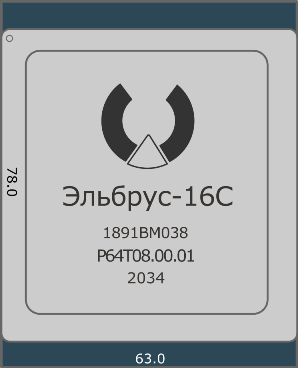
This section provides a comprehensive overview of the processors generation and family, explaining the specific market segment it is designed for. It covers key details such as the CPUs position within its product lineup, its intended use cases (e.g., consumer, server, or workstation), and how its generation compares to previous models.
Elbrus-16S. This section highlights key performance parameters of the processor, including the number of cores, threads, and clock speeds (base and boost frequencies). These metrics directly impact multitasking capabilities and overall system performance in both single-threaded and multi-threaded applications.
This section breaks down the technical characteristics of the memory supported by the processor, including the types (e.g., DDR4, DDR5), number of memory channels, and maximum supported memory speed. It also covers PCI Express support, which determines the bandwidth available for GPUs, SSDs, and other peripherals, critical for high-performance systems.
This section explains the underlying technologies that enable the processor to deliver high performance. It includes details about the manufacturing process (e.g., 7nm, 10nm), supported instruction sets (e.g., AVX, SSE), and virtual machine extensions that enhance compatibility and efficiency across various workloads.
Common positions Elbrus-16S CPU in popular benchmarks, for comparison with other models.
Compare the benchmark scores of Elbrus-16S with other processors to gauge its real-world performance across various tasks..
These tests encompass tasks such as mathematical calculations, 3D rendering, cryptocurrency mining, and performance evaluations in both single-core and multi-core modes.
Similar in technical data processors with Elbrus-16S.
*
PL1 - The power limit (in watts) generated by the processor (or GPU) during sustained, standard operation. It represents the typical thermal output during normal workloads.
PL2 - Represents the maximum power limit under heavy load or overclocking conditions. It indicates the thermal output during peak performance.
These values are essential for determining the optimal cooling system and power supply required to maintain stable performance.